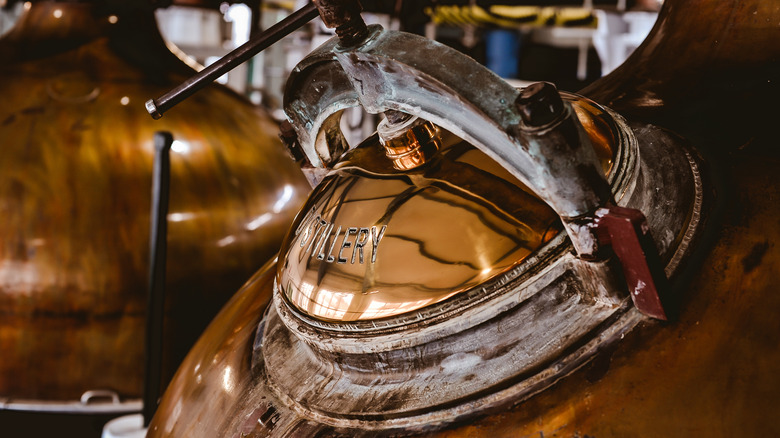What Happens To The Wine That Gets Discarded At Tastings?
If you've ever been to a winery, you'll recall seeing a decanter on the tasting bar, charmingly called a "spit bucket," that's used to collect the discarded wine from patrons.
Let's say you've been given a glass with an unsavory smell or don't like the taste of one of the wines — spit bucket to the rescue. Or, perhaps you've overindulged at a wine festival and decided to call it quits mid-glass — just dump it into the spit bucket. Serious wine drinkers taste and then spit out the wine to get the full flavor without the effect of the alcohol (per Just Wine App). That's a lot of wine going to waste.
The majority of wineries and festivals simply throw away the leftover wine. However, the discarded liquid at one wine festival doesn't go to waste. Someone had the idea of giving those rejects a second chance — a whole new incarnation.
From wine to liquor
They say necessity breeds invention, and that was undoubtedly true for Peter Bignell, a distiller in Tasmania, Australia. He came up with a new idea for discarded wine after attending a wine festival and being outraged by the amount of vino being tossed from the spit buckets at the end of the event.
Bignell devised a solution to turn wasted wine into hard liquor, per Vice. The festival's discards — wine, beer, whiskey, and even cheese — were taken to Poor Tom's gin distillery, where they were distilled into a liquor similar to brandy (per The Guardian). It was such a successful experiment that it's expected to continue with future festivals.
Before you get grossed out and stop reading, know that the process the discards went through involved hours of distilling that no germ could survive. Besides, as The Guardian points out, there are far less appetizing things to drink (civet poop coffee, for instance).
No more wasted wine
Winemakers have a reputation for being resourceful, so this new way of recycling wine that would ordinarily go to waste shouldn't come as a surprise. The industry is moving toward being more efficient and kinder to the planet. Climate change is affecting the grapes used to make wine, so it's in winemakers' best interests to do everything possible to mitigate the effects and eliminate waste.
In Speyside, England, for instance, Discarded Spirits makes distilled spirits from food, such as the grape skins collected from wineries (per Food Navigator). There have also been calls to ban the foil wrappings on the necks of wine bottles to be more eco-friendly (per Wine Enthusiast).
And wineries aren't the only establishments that are becoming more eco-conscious. NPR reports that many restaurants use the wine leftover from a bottle that's been opened too long to make marinades in pickling and preserving.


